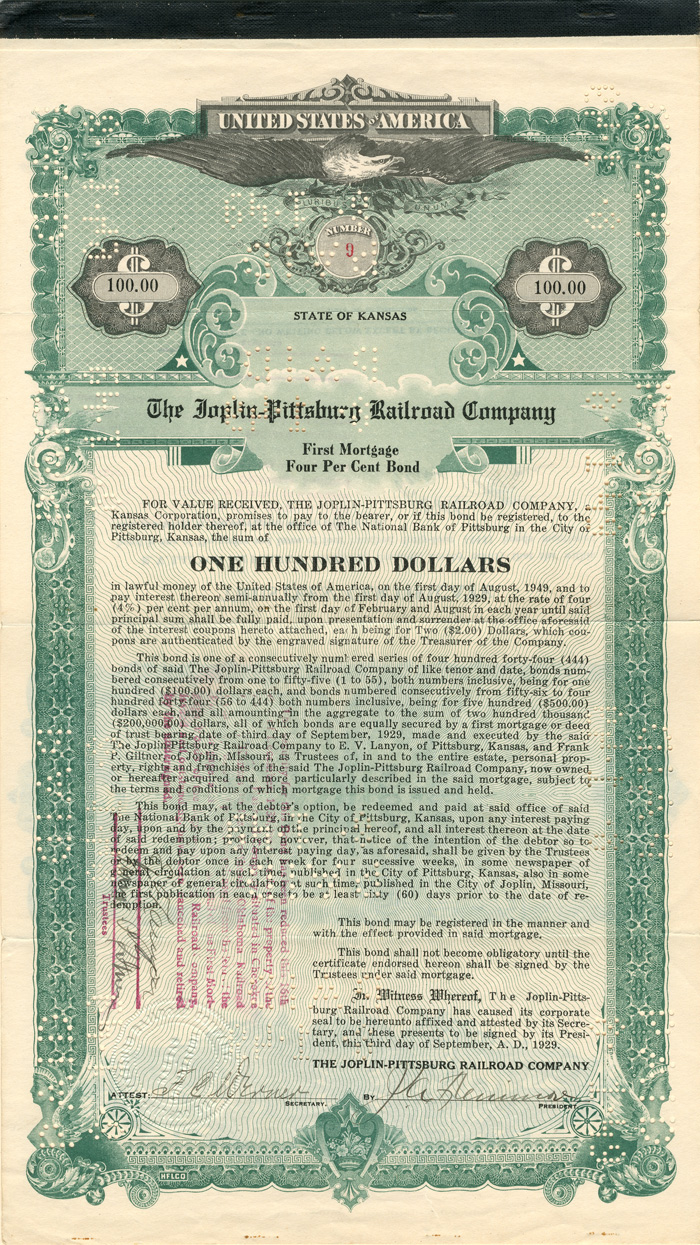Joplin-Pittsburg Railroad Co. - $100 Bond
Inv# RB7103 Bond
$100 4% Bond.
Pittsburg is a city in Crawford County, Kansas, United States, located in Southeast Kansas near the Missouri state border. It is the most populous city in Crawford County and southeast Kansas. As of the 2010 census, the city population was 20,233.
On October 23, 1864, a wagon train of refugees had come from Fort Smith, Arkansas, and was escorted by troops from the 6th Kansas Cavalry under the command of Col. William Campbell. These were local men from Cherokee, Crawford, and Bourbon counties. Their enlistment was over, and they were on their way to Fort Leavenworth to be dismissed from service. They ran into the 1st Indian Brigade led by Maj. Andrew Jackson Piercy near the current Pittsburg Waste Water Treatment Plant. They continued to the north when a small group of wagons broke away in an unsuccessful rush to safety. The Confederate troops caught up with them and burned the wagons. The death toll was three Union soldiers and 13 civilian men who had been with the wagon train. It was likely that one of the Confederates had also been killed. A granite marker memorial for the "Cow Creek Skirmish" was placed near the Crawford County Historical Museum on October 30, 2011.
Pittsburg sprang up in the fall of 1876 on a railroad line being built through the neighborhood. It was named after Pittsburgh, Pennsylvania, and maps of the time give the town's name as "New Pittsburgh". George Hobson and Franklin Playter are credited with being the city's founders, establishing a government after its beginnings as a coal mining camp in the 1870s. The city was incorporated in 1879. The “New” was dropped upon incorporation of the City as a third class city on June 21, 1880, with M. M. Snow as its first Mayor. In 1892 it was advanced to a city of the second class, in 1905 Pittsburg attained the rank of first class.
The first dwelling was built by J. T. Roach in July 1876. The first post office in Pittsburg was established in August, 1876. The post office's name was shortened from "New Pittsburgh" to "Pittsburgh" in 1881 and to "Pittsburg" in 1894. The latter renaming came after the United States Board on Geographic Names, in the interest of standardization, recommended that the 'h' be dropped from place names ending in "burgh".
Pittsburg is the home to Pittsburg State University, founded in 1903 as a normal training institution. Through the years the College became more diversified in its aims and goals, so that it became a multi-purpose institution. It has always had a strong manual and industrial arts program and has trained many of the area's public and private school teachers.
In 1879, two miners from Joplin began the first commercial attempts at mining in close proximity of Broadway Street. A relic of the city's coal mining days was the Pittsburg & Midway Coal Company, founded in 1885, and one of the oldest continuously running coal companies in the United States (even though its headquarters moved several years ago to Denver, Colorado after the Kansas mines closed). In September 2007, Chevron which owned the company, merged it with its Molycorp Inc. coal mining division to form Chevron Mining, thus ending the Pittsburg corporate name. Midway referred to a coal camp in eastern Crawford County, Kansas that was "midway" between Baxter Springs, Kansas and Fort Scott, Kansas. Kenneth A. Spencer, whose father was among the founders of the company was to play an important role in Kansas and Missouri philanthropy.
Pittsburg was also the most heavily unionized city in Kansas at the beginning of the 20th century. In addition to some coal mining, the economic base of the City now rests on industry.
The city has a rich cultural heritage from many Southern and Eastern European mine workers who settled in and around Pittsburg and Southeastern Kansas. It is situated in a once productive coal field. It now relies heavily on education and government-related employment.
A bond is a document of title for a loan. Bonds are issued, not only by businesses, but also by national, state or city governments, or other public bodies, or sometimes by individuals. Bonds are a loan to the company or other body. They are normally repayable within a stated period of time. Bonds earn interest at a fixed rate, which must usually be paid by the undertaking regardless of its financial results. A bondholder is a creditor of the undertaking.










Ebay ID: labarre_galleries